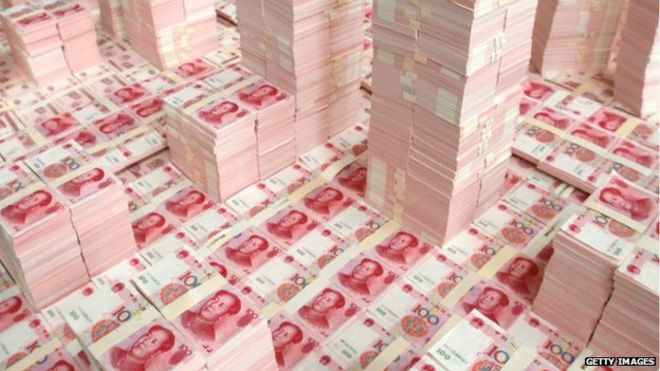China's yuan gains IMF reserve status
- 30 November 2015
- Business
 Getty Images
Getty Images
The International Monetary Fund (IMF) has announced that China's currency, the yuan, will join the fund's basket of reserve currencies.
Currently just the US dollar, the euro, the yen and the pound are in the group.
The IMF said the yuan ``met all existing criteria'' and should become part of the basket in October 2016.
IMF chief Christine Lagarde said it was "an important milestone in the integration of the Chinese economy into the global financial system".
She added it was also a recognition of the progress that the Chinese authorities have made in the past years in reforming China's monetary and financial systems.
The yuan will now make up part of the IMF's Special Drawing Rights (SDR) - an asset created by the IMF which serves almost as a currency.
It is used for transactions between central banks and the IMF, and is used to decide the currency mix that countries like Greece, for example, receive when the IMF provides financial aid.
The last change made to the basket was in 2000, when the euro replaced the German mark and the franc.
China is the world's second largest economy behind the US and asked for the yuan to become a reserve currency last year.

Analysis: Andrew Walker, BBC World Service economics correspondent
More than anything this move is a symbol - a powerful one - of China's meteoric rise, from poverty to pillar of the global economy.
Until now only the currencies of the four leading developed economies were used in the basket that determines the value of the SDR.
So for China to join this very small club is quite a statement of how the world economy has changed. There could also be some real benefits to China.
If the currency's elevated status leads to more being held by central banks businesses and businesses, it would be helpful for the government's finances. A state's monopoly over the issue of currency indirectly gives it an extra source of revenue.
But the main point is that the decision is new way of conveying the increasingly apparent message that China has a central role in driving the performance of the world economy.
Vaswani: The Chinese yuan is going global

What's next?
Some analysts have suggested that by 2030 the yuan will become one of the top three major international currencies, together with the dollar and the euro.
Concerns about Beijing keeping the yuan artificially low to help exporters is one reason the currency has previously failed to meet the criteria for reserve currencies set out by the IMF.
However, Chinese officials have a made a concerted effort to build support for the yuan's inclusion, and a recent IMF staff report endorsed such a move.
Initially, the currency's inclusion would be largely a symbolic gesture, some analysts have said.
They have also said the yuan's continuing inclusion in the basket would depend on whether China progresses with its financial reforms.
No comments:
Post a Comment
Comments always welcome!